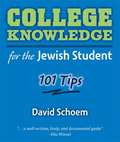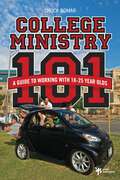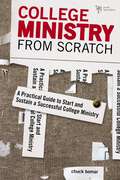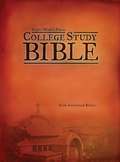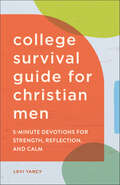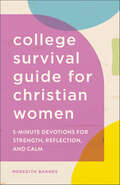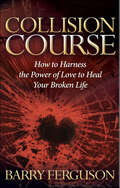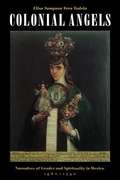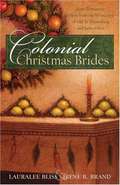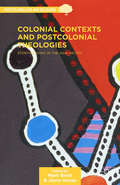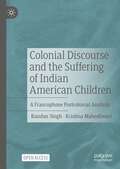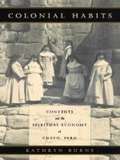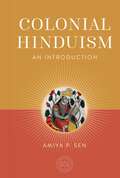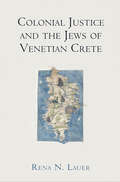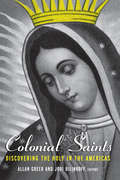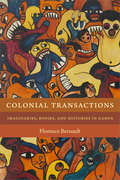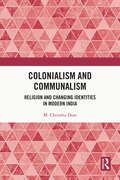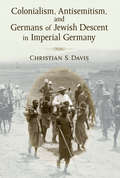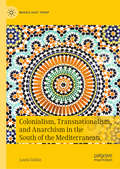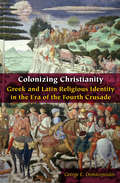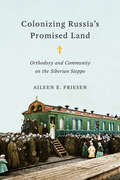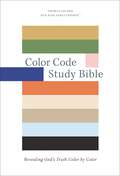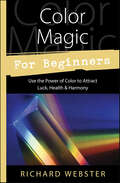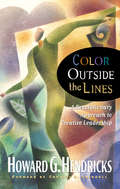- Table View
- List View
College Knowledge for the Jewish Student: 101 Tips
by David Schoem"Students and parents alike will benefit from reading David Schoem's well-written, lively, and documented guide. " ---Elie Wiesel “This is a wonderful sequel to Schoem’s very successful College Knowledge: 101 Tips. As I read through this new volume, I was constantly struck that the advice offered would help all students who approach the college experience with distinctive cultural backgrounds and commitments. Indeed all prospective college students, and their parents, can benefit from this serious yet delightful, well-written and incisive book of advice. I intend to buy one for each of my grandchildren. ” ---Harold Shapiro, former president, Princeton University; former president, University of Michigan For the individual Jewish student who enters college, it is critical that he or she come intellectually, emotionally, and spiritually prepared for the academic and social experience that awaits. College is a qualitatively different experience than high school, and students’ expectations need to be set appropriately. The transition from high school to college is so significant that it can be difficult for most without some preparation. College Knowledge for the Jewish Student: 101 Tips is the perfect guide for students heading off to college with high expectations for learning, academic success, personal growth, and independence. Through lively tips and compelling student stories about life at college, it offers thoughtful, practical information for every Jewish student who wants to make a successful transition. College Knowledge for the Jewish Student includes tips on the academic aspects of college life, like communicating with faculty, learning what is where on campus, where to go for help with coursework, how to manage one’s time for a balanced experience, etc. In addition, it offers advice on dealing with family, finances, health, and safety, as well as the many social and emotional aspects of this important rite of passage.
College Ministry 101: A Guide to Working with 18-25 Year Olds (Especialidades Juveniles Ser.)
by Chuck Bomar18-25-year-olds are trying to find their place in society while living through an array of experiences that force them to reevaluate beliefs and assumptions they were raised with, which leads many students to disconnect from the church after high school. College Ministry 101 will help church leaders understand the college-age-stage in order to better minister to their needs. This book will provide leaders with practical ministry philosophies about how to effectively minister to college students through mentor relationships, what students need in their day-to-day lives, how to work with volunteers in college ministry, and how to turn college-age students into genuine disciples.
College Ministry from Scratch: A Practical Guide to Start and Sustain a Successful College Ministry
by Chuck BomarOut from Under: equipping kids for life out of the shelter of youth group This book dives into our youth ministries, helping youth workers think intentionally about developing a ministry that is geared toward helping prepare kids for what’s to come. This begins by helping them intentionally think through what it is kids will be facing and then helping them think through preparation for those times. This book dives into ministry philosophies that help or hinder this preparation.
College Study Bible: New American Bible
by Virginia Halbur Saint Mary's Press StaffThis College Study Bible was created to meet the academic and spiritual needs of students taking undergraduate Scripture or theology courses and those studying the Bible for the first time. Its many features foster authentic biblical interpretation; make connections between Scripture, Tradition, and life experience; and promote spiritual growth. Features include: Introductory articles on how to read and understand the Bible, along with the Vatican Council II document Dogmatic Constitution on Divine Revelation ( Dei Verbum, 1965) Scholarly introductions to each section and book of the Bible, written and edited so that unfamiliar concepts and customs are easy to understand Ninety short articles that address the social concerns, life issues, and spiritual needs of a student In-text maps, illustrations, charts, biblical art, and photos throughout the Bible to provide a visual context to aid student understanding.
College Survival Guide for Christian Men: 5-Minute Devotions for Strength, Reflection, and Calm
by Levi YancyKeep God close throughout college College can be an exciting and overwhelming time, full of big changes and new experiences. This devotional for men makes it easy to carve out moments of calm and stay connected to faith as you discover everything college has to offer.What sets this college survival guide apart from other college books:Short and sweet—Bolster your faith in just a few minutes with quick devotions designed to complement the busy life of any college student.Relevant topics—Explore a wide range of Bible passages and discover how God can provide guidance on everything from dating to living with purpose.Thoughtful prompts—Reflect on the Lord's wisdom and consider how to apply His lessons to your life with insightful, open-ended questions at the end of every devotion.Foster your faith and find support as an undergrad with the College Survival Guide for Christian Men.
College Survival Guide for Christian Women: 5-Minute Devotions for Strength, Reflection, and Calm
by Meredith BarnesKeep God close throughout college College can be an exciting and overwhelming time, full of big changes and new experiences. This book of devotions for women makes it easy to carve out moments of calm and stay connected to your faith as you discover everything college has to offer.What sets this college survival guide apart from other college books:Short and sweet—Bolster your faith in just five minutes with quick devotions designed to complement the busy life of any college woman.Relevant topics—Explore a wide range of Bible passages and discover how God can provide guidance on personal boundaries, peer pressure, and more.Thoughtful prompts—Reflect on the Lord's wisdom and consider how to apply His lessons to your life with insightful, open-ended questions at the end of every devotion.Foster your faith and find support as an undergrad with The College Survival Guide for Christian Women.
Collision Course: How to Harness the Power of Love to Heal Your Broken Life
by Barry FergusonDiscover The Secret To Transforming Your LifeIs your life spiraling out of control? Have you tried everything to heal the pain you feel deep inside, but still feel lost and lonely?Barry Ferguson takes you on a fantastic journey of discovery through his own transformation by weaving his personal story with a proven step-by-step roadmap that will heal even the most hardened of hearts. After nearly dying in two separate car accidents during a six-week period, Barry set off on a quest to completely change his life and find his true calling. What he found has been distilled into an easy to digest, faith-based guide to living a heart-centered life built upon God’s unconditional love.Despite his many failures in life, Barry has learned from his mistakes and helps others do the same. He believes that everyone deserves to be loved…including you. Digging deep into his own disappointments, Barry gives an authentic account of resurrection from the depths of his own broken life to inspire others in becoming the people God wants them to be.Collision Course is an incredible resource for any follower of Jesus who has felt a crisis of faith at one time or another, as well as for those who are new to the Christian journey. Barry shows how the journey of life is more important than the destination, and everything you need to succeed in life comes from God.If you died today, could you honestly say you gave more love than you took?What would you do to change the equation?
Colloquies on Society
by Robert SoutheyA 19th-Century author examines the questions of society in the form of discussions with the ghost of Sir Thomas More.
Colonial Angels: Narratives of Gender and Spirituality in Mexico, 1580-1750
by Sampson Vera Tudela ElisaThe author argues that the New World context necessitated the creation of a new kind of writing. Drawing on previously unpublished writings by and about nuns in the convents of Mexico City, she investigates such topics as the relationship between hagiography and travel narratives, male visions of the feminine that emerge from the reworking of a nun's letters to her confessor into a hagiography, the discourse surrounding a convent's trial for heresy by the Inquisition, and the reports of Spanish priests who ministered to noble Indian women. This research rounds out colonial Mexican history by revealing how tensions between Spain and its colonies played out in the local, daily lives of women.
Colonial Christmas Brides
by Lauralee Bliss Irene B. BrandFor Colonial settlers in Jamestown and Williamsburg who were enduring the hardships of carving a home out of the wilderness, Christmas was a reminder of where they came from and their hope for the future. But for some, finding the faith and joy necessary for celebration is a daunting task. Susanna's introduction to America is on a bride ship. Paul lost his livelihood in a fire. Raven is to be married off to a much older man. Mary grieves her husband's murder. Can these lonely souls open their hearts to the gift of love?
Colonial Contexts And Postcolonial Theologies: Storyweaving in the Asia-Pacific (Postcolonialism and Religions)
by Jione Havea Mark G. BrettColonial Contexts and Postcolonial Theology focuses on what postcolonial theologies look like in colonial contexts, particularly in dialogue with the First Nations Peoples in Australia and the Asia-Pacific. The contributors have roots in the Asia-Pacific, but the struggles, theologies and concerns they address are shared across the seas.
Colonial Discourse and the Suffering of Indian American Children: A Francophone Postcolonial Analysis
by Kundan Singh Krishna MaheshwariEuro-American misrepresentations of the non-West in general, and in particular on Hinduism and ancient India, run deep and have far greater colonial connections than that have been exposed in academia. This book analyzes the psycho-social consequences that Indian American children face after they are exposed to the school textbook discourse on Hinduism and ancient India. The authors show that there is an intimate connection—an almost exact correspondence—between James Mill’s colonial-racist discourse and the current school-textbook discourse. The very parameters and coordinates on which James Mill constructed the discourse are the ones that are being used to describe Hinduism, Hindus, and ancient India in the textbooks currently. Consequently, this archaic and racist discourse, camouflaged under the cover of political correctness, produces in the Indian American children a psychological impact quite similar to what racism is known to produce: shame, inferiority, embarrassment, identity confusion, assimilation, and a phenomenon similar to racelessness where the children dissociate from the tradition and culture of their ancestors. This book argues that the current school textbook discourse on Hinduism and India needs to change so that the Indian American children do not become victims of overt and covert racism. For the change to occur, the first step is to recognize the overarching and pervasive influence of the colonial-racist discourse of James Mill on the textbooks. For the reconstruction of the discourse to take place, the first step is to engage in a through deconstruction, which is what the book attempts.
Colonial Habits: Convents and the Spiritual Economy of Cuzco, Peru
by Kathryn BurnsIn Colonial Habits Kathryn Burns transforms our view of nuns as marginal recluses, making them central actors on the colonial stage. Beginning with the 1558 founding of South America's first convent, Burns shows that nuns in Cuzco played a vital part in subjugating Incas, creating a creole elite, and reproducing an Andean colonial order in which economic and spiritual interests were inextricably fused. Based on unprecedented archival research, Colonial Habits demonstrates how nuns became leading guarantors of their city's social order by making loans, managing property, containing "unruly" women, and raising girls. Coining the phrase "spiritual economy" to analyze the intricate investments and relationships that enabled Cuzco's convents and their backers to thrive, Burns explains how, by the late 1700s, this economy had faltered badly, making convents an emblem of decay and a focal point for intense criticism of a failing colonial regime. By the nineteenth century, the nuns had retreated from their previous roles, marginalized in the construction of a new republican order. Providing insight that can be extended well outside the Andes to the relationships articulated by convents across much of Europe, the Americas, and beyond, Colonial Habits will engage those interested in early modern economics, Latin American studies, women in religion, and the history of gender, class, and race.
Colonial Hinduism: An Introduction (The Oxford Centre for Hindu Studies Mandala Publishing Series)
by Amiya P. SenIn a tightly woven narrative, historian of modern India Amiya P. Sen traces the shifting self-understanding of Hindus in the light of the many challenges posed by the British colonial encounter, offering an accessible yet analytically rich book on the birth and development of modern Hinduism, which will be of interest to students and the interested general reader alike.Change has been endemic to Hindu cultural life from its inception. It was nevertheless in the modern era, with the advent of British colonial rule in India, that this change had its most far-reaching consequences, profoundly shaping the landscape of Hinduism as we encounter it today. In Colonial Hinduism: An Introduction, Amiya P. Sen charts this many-layered historical process in a refreshingly accessible narrative. Over seven chapters, this book traces the shifting self-understanding of the Hindus in the light of new challenges posed by the West. This encounter brought forth a new Hindu consciousness that was prepared to critique India&’s perceived past irrationalities and superstitions but also reject what it took to be the excesses of the materialistic West. Over the years, a surging Hindu nationalism and anti-colonial sentiment sought to counter the material advances of the West with the self-acclaimed spiritual excellence of India in order to to secure for India a rightful place within global civilisation. In time, however, Hindu nationalism produced its own excesses, the ramifications of which India is still contending. Colonial Hinduism: An Introduction fulfils the long standing need for an accessible yet analytically rich book on the birth and development of modern Hinduism, which will be of interest to students and the interested general reader alike. OXFORD CENTRE SERIES: The Oxford Centre for Hindu Studies Publishing Series offers authoritative yet accessible introductions to a wide range of subjects in Hindu Studies. Each book in the series aims to present its subject matter in a form that is engaging and readily comprehensible to persons of all backgrounds – academic or otherwise – without compromising scholarly rigour. The series thus bridges the divide between academic and popular writing by preserving and utilising the best elements of both. Other books in the series include The Bhagavad Gita: A New Translation and Study Guide; The Hindu Temple and Its Sacred Landscape; and Women in the Hindu World. EXPERT AUTHOR: Amiya P. Sen, PhD, is a historian with an interest in the intellectual and cultural history of modern India. Sen has been Agatha Harrison Fellow at the University of Oxford, Shivdasani Fellow at the Oxford Centre for Hindu Studies, Heinrich Zimmer Chair at the University of Heidelberg, and Fellow at the Indian Institute of Advanced Study, Shimla, and the Nehru Memorial Museum & Library, New Delhi, He has served the Universities of Delhi, Visva Bharati, Santiniketan, and Jamia Millia Islamia, New Delhi. EDUCATION AID: With the integration of discussion questions, suggested further reading, glossary of terms, and images throughout, this book serves as a comprehensive resource for both classwork and independent study of modern Hinduism.
Colonial Justice and the Jews of Venetian Crete (The Middle Ages Series)
by Rena N. LauerWhen Venice conquered Crete in the early thirteenth century, a significant population of Jews lived in the capital and main port city of Candia. This community grew, diversified, and flourished both culturally and economically throughout the period of Venetian rule, and although it adhered to traditional Jewish ways of life, the community also readily engaged with the broader population and the island's Venetian colonial government.In Colonial Justice and the Jews of Venetian Crete, Rena N. Lauer tells the story of this unusual and little-known community through the lens of its flexible use of the legal systems at its disposal. Grounding the book in richly detailed studies of individuals and judicial cases—concerning matters as prosaic as taxation and as dramatic as bigamy and murder—Lauer brings the Jews of Candia vibrantly to life. Despite general rabbinic disapproval of such behavior elsewhere in medieval Europe, Crete's Jews regularly turned not only to their own religious courts but also to the secular Venetian judicial system. There they aired disputes between family members, business partners, spouses, and even the leaders of their community. And with their use of secular justice as both symptom and cause, Lauer contends, Crete's Jews grew more open and flexible, confident in their identity and experiencing little of the anti-Judaism increasingly suffered by their coreligionists in Western Europe.
Colonial Saints: Discovering the Holy in the Americas, 1500–1800
by Allan Greer Jodi BilinkoffFrom the cult of Saint Anne to the devotees of the Virgin of Guadalupe, from Saint Anthony who competed with Christ for popularity in Brazil, to Jesuits who mixed freely with shamans that talked with the gods, this exciting new anthology examines the conversion of the colonized. The essays examine how New World spirits transformed into Old World saints - for example, the spirit of love transfigured into the Virgin Mary - as well as the implications of the canonization of the first American saint. Colonial Saints illustrates the complex and intimate connections among confessional life writing, canonization, and the practices of the Inquisition. There was a dynamic exchange involving local agendas, the courts in Spain and France, and, of course, Rome. This bold collection clearly shows the interplay between slavery and spirituality, conversion and control, and the links between the sacred and the political.
Colonial Transactions: Imaginaries, Bodies, and Histories in Gabon (Theory in Forms)
by Florence BernaultIn Colonial Transactions Florence Bernault moves beyond the racial divide that dominates colonial studies of Africa. Instead, she illuminates the strange and frightening imaginaries that colonizers and colonized shared on the ground. Bernault looks at Gabon from the late nineteenth century to the present, historicizing the most vivid imaginations and modes of power in Africa today: French obsessions with cannibals, the emergence of vampires and witches in the Gabonese imaginary, and the use of human organs for fetishes. Struggling over objects, bodies, agency, and values, colonizers and colonized entered relations that are better conceptualized as "transactions." Together they also shared an awareness of how the colonial situation broke down moral orders and forced people to use the evil side of power. This foreshadowed the ways in which people exercise agency in contemporary Africa, as well as the proliferation of magical fears and witchcraft anxieties in present-day Gabon. Overturning theories of colonial and postcolonial nativism, this book is essential reading for historians and anthropologists of witchcraft, power, value, and the body.
Colonialism and Communalism: Religion and Changing Identities in Modern India
by M. Christhu DossChristhu Doss examines how the colonial construct of communalism through the fault lines of the supposed religious neutrality, the hunger for the bread of life, the establishment of exclusive village settlements for the proselytes, the rhetoric of Victorian morality, the booby-traps of modernity, and the subversion of Indian cultural heritage resulted in a radical reorientation of religious allegiance that eventually created a perpetual detachment between proselytes and the “others.”Exploring the trajectories of communalism, Doss demonstrates how the multicultural Indian society, known widely for its composite culture, and secular convictions were categorized, compartmentalized, and communalized by the racialized religious pretensions. A vital read for historians, political scientists, sociologists, anthropologists, and all those who are interested in religions, cultures, identity politics, and decolonization in modern India.
Colonialism, Antisemitism, and Germans of Jewish Descent in Imperial Germany
by Christian S. DavisColonialism, Antisemitism, and Germans of Jewish Descent in Imperial Germany examines the relationship between the colonial and antisemitic movements of modern Germany from 1871 to 1918, examining the complicated ways in which German antisemitism and colonialism fed off of and into each other in the decades before the First World War. Author Christian S. Davis studies the significant involvement with and investment in German colonialism by the major antisemitic political parties and extra-parliamentary organizations of the day, while also investigating the prominent participation in the colonial movement of Jews and Germans of Jewish descent and their tense relationship with procolonial antisemites. Working from the premise that the rise and propagation of racial antisemitism in late-nineteenth-century Germany cannot be separated from the context of colonial empire,Colonialism, Antisemitism, and Germans of Jewish Descent in Imperial Germanyis the first work to study the dynamic and evolving interrelationship of the colonial and antisemitic movements of the Kaiserreich era. It shows how individuals and organizations who originated what would later become the ideological core of National Socialism---racial antisemitism---both influenced and perceived the development of a German colonial empire predicated on racial subjugation. It also examines how colonialism affected the contemporaneous German antisemitic movement, dividing it over whether participation in the nationalist project of empire building could furnish patriotic credentials to even Germans of Jewish descent. The book builds upon the recent upsurge of interest among historians of modern Germany in the domestic impact and character of German colonialism, and on the continuing fascination with the racialization of the German sense of self that became so important to German history in the twentieth century.
Colonialism, Transnationalism, and Anarchism in the South of the Mediterranean (Middle East Today)
by Laura GaliánThis book explores the unsettling ties between colonialism, transnationalism, and anarchism. Anarchism as prefigurative politics has influenced several generations of activists and has expressed the most profound libertarian desire of Southern Mediterranean societies. The emergence of anarchist and anti-authoritarian movements and collective actions from Morocco to Palestine, Algeria, Tunis, Egypt, Lebanon, Syria and Jordan has changed the focus of our attention in the last decade. How have these anarchist movements been formulated? What characteristics do they share with other libertarian experiences? Why are there hardly any studies on anarchism in the South of the Mediterranean? In turn, the book critically reviews the anti-authoritarian geographies in the South of the Mediterranean and reassesses the postcolonial status of these emancipatory projects. Colonialism, Transnationalism, and Anarchism in the South of the Mediterranean invites us to revisit the necessity of decolonizing anarchism, which is enunciated, in many cases, from a privileged epistemic position reproducing neocolonial power relations.
Colonizing Christianity: Greek and Latin Religious Identity in the Era of the Fourth Crusade (Orthodox Christianity and Contemporary Thought)
by George E. DemacopoulosColonizing Christianity employs postcolonial critique to analyze the transformations of Greek and Latin religious identity in the wake of the Fourth Crusade. Through close readings of texts from the period of Latin occupation, this book argues that the experience of colonization splintered the Greek community over how best to respond to the Latin other while illuminating the mechanisms by which Western Christians authorized and exploited the Christian East. The experience of colonial subjugation opened permanent fissures within the Orthodox community, which struggled to develop a consistent response to aggressive demands for submission to the Roman Church.
Colonizing Russia’s Promised Land: Orthodoxy and Community on the Siberian Steppe
by Aileen E. FriesenThe movement of millions of settlers to Siberia in the late nineteenth and early twentieth centuries marked one of the most ambitious undertakings pursued by the tsarist state. Colonizing Russia’s Promised Land examines how Russian Orthodoxy acted as a basic building block for constructing Russian settler communities in current-day southern Siberia and northern Kazakhstan. Russian state officials aspired to lay claim to land that was politically under their authority, but remained culturally unfamiliar. By exploring the formation and evolution of Omsk diocese – a settlement mission – Colonizing Russia’s Promised Land reveals how the migration of settlers expanded the role of Orthodoxy as a cultural force in transforming Russia’s imperial periphery by "russifying" the land and marginalizing the Indigenous Kazakh population. In the first study exploring the role of Orthodoxy in settler colonialism, Aileen Friesen shows how settlers, clergymen, and state officials viewed the recreation of Orthodox parish life as practised in European Russia as fundamental to the establishment of settler communities, and to the success of colonization. Friesen uniquely gives peasant settlers a voice in this discussion, as they expressed their religious aspirations and fears to priests and tsarist officials. Despite this agreement, tensions existed not only among settlers, but also within the Orthodox Church as these groups struggled to define what constituted the Russian Orthodox faith and culture.
Color Code Study Bible, Revealing God's Truth Color by Color (NKJV)
by Thomas NelsonThe Color Code Study Bible provides a clear path to understanding the Bible.The Color Code Study Bible uses vibrant colors to highlight Bible verses on seven key topics of the Bible, helping you see the topic within all of Scripture. The seven key topics include: (1) God the Father; (2) God the Son; (3) God the Holy Spirit; (4) Salvation; (5) Sanctification; (6) Sin and Temptation; and (7) Last Things.Additionally, you will find helpful notes throughout the Scripture leading you to study the Bible book by book, verse by verse, or topic by topic. Whether you choose one approach or all three, the Color Code Study Bible gives you dynamic, practical approach for regular Bible reading—and even includes generous margins for your own notes.The Color Code Bible system will help you gain a better understanding of the Bible one idea at a time, growing deeper in your relationship with God. Features include:Easy-to-use color code system that highlights 7 core concepts of the BibleBook-by-book notes to better understand the key ideas of each Bible bookVerse-by-verse notes at the bottom of the page to gain deeper insight into each chapterTopic-by-topic notes to bring clarity on 21 key doctrinal concepts in the BibleGenerous 1.25" note-taking space in the outer marginsEngaging, full color throughout the BibleConcordance included to facilitate study
Color Magic for Beginners: Use the Power of Color to Attract Luck, Health & Harmony (Llewellyn's For Beginners)
by Richard WebsterFrom our clothes to the color of our bedroom walls, we are surrounded by colors that influence our mood, energy level, creativity, and overall well being. Richard Webster offers an astonishing number of ways to use stimulating reds, soothing blues, and every other color of the rainbow to our advantage.Webster begins with an overall picture of each color's major aspects—its psychological influence, healing qualities, emotional impact, and magical characteristics. From there, readers learn a multitude of color-based techniques involving astrology, the aura, candle magic, chakras, color rituals, crystals and gemstones, feng shui, flower magic, mandalas, meditation, numerology, and visualization. Webster demonstrates how color can be used to attract good luck, heal illness, reduce stress, create harmony in the home, overcome depression, solve problems, and magically enhance one's life in a variety of ways.
Color Outside the Lines
by Howard HendricksAll of us yearn to be creative, but few of us feel we truly are. In this fun-to-read, energy-packed guide to stimulating our ingenuity, Hendricks proposes a nine-step process for unleashing an exciting spark of creativity and innovation in our lives, including creative approaches to problem solving such as mind-mapping, storyboarding, brainstorming, and five-sensing. With dynamic examples and proven concepts, Hendricks helps us to identify roadblocks that may keep us from being creative in our lives and ministries, and helps to unleash our creative potential.
